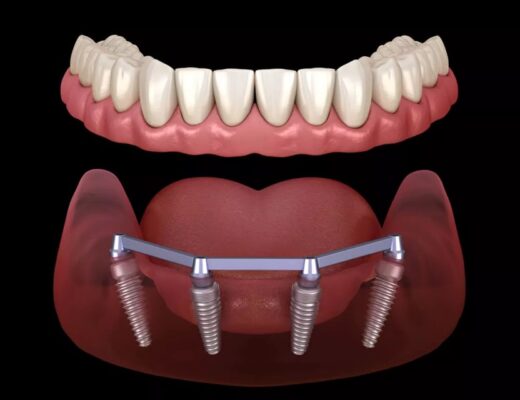America’s mental health epidemic is the nation’s “silent killer.” More than one in five adults carries a mental health diagnosis and suicide is now the second-leading cause of death in teens and young adults.
With depression, anxiety, and PTSD on the rise, the mental health stigma — both internal and public — is still our most formidable opponent.
Many keep their struggles hidden from the world out of fear.
Fear of being labeled (“crazy”).
Fear of losing opportunities (being fired or losing friendships).
Fear of that dreaded “Scarlet letter” (feeling less-than or looked down upon).
There’s no shame in asking for help. If you’re ready to get your mental health back on track, here are seven strategies.
Talk To A Trusted Adult [Friend, Parent, Professor, Etc.]
The worst thing you can do when you’re struggling is to bottle your emotions and thoughts up and slam the door on your support system.
Find someone — anyone — that you feel comfortable talking to. Choose a person who’s notoriously reliable, caring, and willing to lend a listening ear (or even a shoulder to cry on).
Who’s the first person that comes to mind?
Maybe it’s a:
- Professor or teacher
- Parent
- Friend
- Aunt or uncle
- Cousin
- Sibling
- Teammate
- Colleague
- … or even a complete stranger
Remember: you set the stage for this conversation. Let your confidant know that you want to vent (don’t just unleash something heavy). Also, tell them ahead of time what role they’ll play: just listening or offering advice.
This is not a permanent solution and, if your vent sessions turn into weekly or even daily get-togethers, seek professional help.
Complete An Online Mental Health Screening
If you survived 20-something years without a mental health crisis, then a sudden depression or panic attack can feel unusual.
It’s hard to explain the feelings of impending doom, social anxiety triggers, or why hopping in the shower each morning is such a challenge.
But you know that something just isn’t right.
The online mental health screening tests (by Mental Health America) can answer the question: is this everyday stress, or is this an underlying condition?
A word to the wise: these tests aren’t official medical diagnoses. But if the screening indicates a high disorder probability, you should seek professional help.
Know Your Hotline Numbers
Mental health can be a touchy and uncomfortable subject.
There may be times when you’re struggling, and either your usual confidant is unreachable, or your anguish strikes at 2 a.m. Or you need to vent about something that you’d prefer to keep far from your inner circle.
Don’t suffer alone.
When desperation peaks, phone these hotline numbers for support:
- National Suicide Prevention Lifeline: 800-273-8255
- SAMHSA’s National Helpline: 1-800-662-HELP
- National Hopeline Network: 1-800-442-4673
- Crisis Text Line: Text CONNECT to 741741
- Domestic Violence (loveisrespect): 1-866-331-9474
- The Trevor Project (LGBTQ): 866-488-7386
- National Eating Disorder Association: 1-800-931-2237
Most of these hotlines are staffed 24/7, 100% confidential, and will connect you with a local treatment center if needed.
Find A Mental Health Professional Or Treatment Center
Making an appointment with a therapist (or even a psychiatrist) isn’t a sign of weakness or failure. In fact, about 42% of American adults admit to doing so at some point in their lives.
A Mental Health Professional is a highly trained and compassionate individual dedicated to supporting and improving the mental and emotional well-being of others. These professionals come from various backgrounds, including psychiatry, psychology, counseling, and social work, and they possess the knowledge and expertise to help individuals facing a wide range of mental health challenges.
Whether it’s managing stress, coping with anxiety and depression, navigating relationships, or addressing more complex conditions, a Mental Health Professional offers a safe and supportive environment for individuals to explore their thoughts and feelings. Their guidance and therapeutic interventions empower people to develop coping strategies, gain insights, and work towards positive mental health outcomes.
Accessing the expertise of a Mental Health Professional is a crucial step for those seeking assistance on their mental health journey. Furthermore, mental health professionals may collaborate with a mental health marketing agency to ensure their services reach those in need, facilitating the process of connecting individuals with the right support.
Linking up with the right counselor or doctor can be stressful.
But some of the best mental health resources and directories tend to be:
- Your health insurance provider
- Mental health organizations (like NAMI)
- Psychology Today (therapists, support groups, psychiatrists)
- Talkspace (online counseling)
- Local nonprofits
- Churches and religious organizations
Your first-ever appointment can be downright terrifying.
What can you say? What’s off-limits?
Not to worry; unless you’re admitting that you’re a danger to yourself or others, it’s 100% confidential.
Join A Local Support Group
Does your insurance provider decline to cover therapy? Or, you’re too bogged down for rigid appointment scheduling with a regular therapist?
Consider joining a support group instead.
Most welcome new members, meet regularly, and offer a connectedness for those wrestling the same vices.
No matter what you’re struggling with internally, there’s probably a local support group for it, like:
- Grief and bereavement
- Codependency (Codependents Anonymous)
- Alcohol abuse (Alcoholics Anonymous)
- Drug abuse (Narcotics Anonymous)
- Gambling (Gambler’s Anonymous)
- Eating disorders
- Condition-specific (bipolar, anxiety, depression, BPD)
- Self-harm
You don’t have to share if you don’t feel comfortable; feel free to sit back and listen to your peers as they speak. Sometimes, simply realizing you’re not waging an impossible battle can change your life.
Take Care Of Yourself
When you spiral mentally, other areas of your health fall along with it:
- work responsibilities
- relationships
- finances
- physical health
It can seem like an uphill battle, but try to dedicate time to taking care of yourself.
Eat healthily and exercise, even if it’s a small snack and a walk around the block. Practice yoga, socialize with your circle, ask for support, and write a gratitude journal to describe what you’re thankful for.
Most of all, shy away from drugs and alcohol. The temporary relief can feel soothing at first. However, it can also interfere with your brain chemicals, encouraging unhealthy coping strategies. (Not to mention addiction.)
Use these strategies in conjunction with genuine treatment, not instead of.
Call 9-1-1 [Or Your Local Emergency Number]
If you’re in a crisis and thinking about hurting yourself or others, call 9-1-1 immediately (or your country’s emergency helpline).
This step is about finding help, not facing punishment.
An ambulance or police officer will transport you to an emergency room or an in-patient behavioral health facility.
Conclusion
One therapy appointment, 30-minute run, support group meeting, or venting session alone won’t “cure” you. But committing to your treatment plan can help you regain your old self again.
Your story isn’t over, and you’re not alone.
There’s no better day to ask for help than today.
Author Bio
 Adam Marshall is a freelance writer who specializes in all things apartment organization, real estate, and college advice. He currently works with Arch at Bloomington to help them with their online marketing.
Adam Marshall is a freelance writer who specializes in all things apartment organization, real estate, and college advice. He currently works with Arch at Bloomington to help them with their online marketing.








No Comments